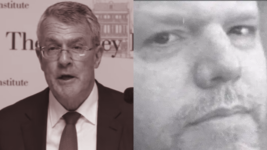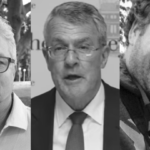Government Continues to Prosecute ATO Whistleblower, Despite Court Finding His Disclosures Were Legally Justified

Australian Taxation Office whistleblower Richard Boyle was before the South Australian District Court on Monday 11 November 2024 for a directions hearing relating to his criminal trial that involves his having exposed ATO wrongdoing in mid-2017, which was in the form of having debt collecting officers dipping into small business accounts to extract outstanding debts at an earlier point than ATO protocol permitted.
Stark anomalies pervade the ex-public service officer’s prosecution. These include the same court having earlier ruled that Boyle was correct in making his disclosure to the press, and instead he’s about to be fried in respect of preparatory acts he took to prove his case, and this is at the same time that the attorney general is considering providing criminal immunity to such acts in the future.
Boyle had applied for special leave to appeal this controversial finding of the South Australian courts, which hasn’t garnered the public scrutiny it clearly continues to warrant, because, as it stands, AG Mark Dreyfus’ 2013 public interest disclosure laws do encourage public service officers to call out corruption, however it appears that if they do take up this bait, they’re likely to then be punished.
Section 10(1)(a) of the Dreyfus-drafted Public Interest Disclosure Act 2013 (NSW) (PID Act) provides that if “an individual makes a public interest disclosure, the individual is not subject to any civil, criminal or administrative liability (including disciplinary action) for making the public interest disclosure”. But, as the SA appeals court confirmed in June, this does not extend to preparatory acts.
SA District Court Judge Liesl Kudelka confirmed that the trial date of the case that involves over 24 criminal charges relating to building his public interest disclosure is another 12 months away and is expected to last for three weeks at the end of 2025, which ensures that by the time Richard stands before the court next November, he’ll have been dragged across the coals for close to nine years.
Encouraged by the state
Dozens of Boyle’s supporters gathered at the court on Monday. These demonstrators are part of a broader collective who’ve long been campaigning against a bipartisan crackdown on whistleblowers that commenced in 2018 with the charging of ASIS whistleblower Witness K, his lawyer Bernard Collaery and then ADF lawyer David McBride and ended with Richard’s charging in early 2019.
“I was extremely disappointed that my High Court appeal special leave application was refused, that means that there is no impediment to my prosecution,” the ABC reports Boyle as having told the crowd of his supporters gathered on Monday prior to his appearance in court. And he added that he would be taking the stand to testify in his own defence in a year from now.
Boyle was seeking leave to appeal in regard to the finding that the section 10 PID Act criminal immunity does not extend to acts that whistleblowers understandably take in gathering information to support their case prior to reporting it. Richard took the correct legislated steps in blowing the whistle: doing so internally, then to an oversight body, prior to taking the revelations to the ABC.
However, the High Court listed Boyle’s case amongst 39 matters it declined to grant special leave to appeal last Thursday.
Boyle further set out that attorney general Dreyfus recently gave a speech entitled Transparency and Accountability in Politics, in which he told a crowd at the Sydney Institute about how “extremely proud” he is of the laws contained within the PID Act, of which he drafted in 2013, when he first held the position of federal chief lawmaker.
“I don’t know what rational person can be proud of a law that is supposed to protect whistleblowers, when the only person who has ever sought immunity under the Public Interest Disclosure Act is myself,” Boyle made clear. “I’m the first person to initiate proceedings for protection and those protections have failed.”
No pride in denial of justice
“Improved whistleblower protection has long been an interest of mine,” said the federal AG during his mid-September transparency speech. And as Boyle pointed out on Monday, Dreyfus went on to hold up his PID Act as one of his proudest achievements, apart from the fact that the only time that someone has been able to argue their defence under it, Boyle in October 2022, it failed him.
Under the Morrison government, several high-profile whistleblower prosecutions were launched: Witness K-Collaery, McBride, who is currently serving a 5-year-8-month-long head sentence for exposing war crimes, and the remaining yet-to-be-resolved prosecution that’s currently hanging over Boyle’s head.
In his position as opposition legal spokesperson in October 2021, Dreyfus declared that he had been disappointed by the Coalition government’s refusal to progress recommendations made by the 2016 Moss inquiry report to improve the PID Act, and because of this, he vowed to give the legislation a major overhaul if returned to office.
The AG is yet to produce his long promised substantive redrafting of the PID Act. He did progress amendments to it that provided provisions to protect those making disclosures to the National Anti-Corruption Commission (NACC), which weren’t announced until the month following Boyle having been made to argue his public interest disclosure defence under the original dodgy law.
South Australian Supreme Court Justice David Lovell explained in his final findings in respect of Boyle’s appeal of his original PID defence case, that it was “common ground” that his “conduct in disclosing the information attracted an immunity from criminal prosecution, under the PID Act. But he further found the section 10 immunities don’t extend to his conduct in gathering evidence.
However, Dreyfus issued a November 2023 consultation paper that relates to his elusive planned overhaul of the PID Act, which raises the question of whether a reformed PID Act should extend criminal immunity for the preparatory acts that whistleblowers take in building their disclosures, which means that what Boyle is currently set to stand trial over could be above board in the future.
As it is, Boyle is facing up to 46 years of imprisonment for acts that involve taking photos of taxpayer information, covertly recording conversations with his fellow employees and then uploading this information onto an email account that was never accessed.
Drop the prosecution
Judge Kudelka made clear on Monday that she expects counsel for the defence and the prosecution to reappear in court next month to “discuss this matter both in terms of possible resolutions, and also in terms of witnesses that are required and the length of trial”.
In “terms of possible resolutions”, Boyle’s supporters continue to call upon AG Dreyfus to drop the charges against the whistleblower, whose disclosure resulted in an end to the dodgy ATO practice, as the chief lawmaker has the power to end any prosecution using the power contained in section 71 of the Judiciary Act 1903 (Cth).
Indeed, Dreyfus used this power in order to drop the prosecution against Collaery in June 2022. And when the Alliance Against Political Prosecutions pressed Dreyfus on why, following his having let Collaery off the hook, he didn’t extend this pardoning power to Boyle or McBride, the AG replied that he can only exercise this power under “very unusual and exceptional circumstances”.
But the point is that a civilian is set to be imprisoned for acts taken in building a case to expose ATO corruption at the same time as the government contemplates passing laws that would recognise these criminal acts as being immune from criminal prosecution for any future disclosers that do blow the whistle, which does appear to be a highly unusual and exceptional set of circumstances.







